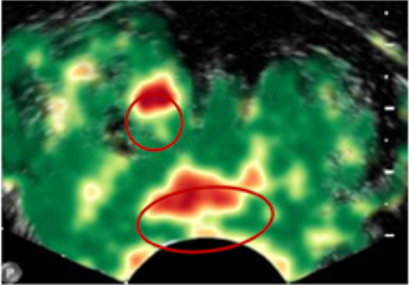Prostate cancer detection using ultrasound (PCaVision)
Background
Each year over 1.5 million men are suspected to have prostate cancer (PCa) based on an increased PSA (Prostate Specific Antigen) blood value. Each suspected patient is subsequently tested to determine whether the indication is actually true and what the stage of the PCa is. At present this diagnosis involves taking 12-18 tissue biopts. Apart from patient discomfort, related problems with this method are: 6% infection risk, 40% false negatives and a 75% over-treatment rate. In recent years MRI imaging protocols have been developed as an alternative. But MRI based PCa diagnosis and imaging has drawbacks: reliability, cost, dependent on (trained) radiologists, and availability. PCaVision is a novel ultrasound based alternative. Its advanced techniques enable the detection, localization, imaging and characterisation of PCa induced vascular growth. The resulting clinical solution reduces cost, improves patient outcomes and simplifies the patient care pathway.
Project goal
Current PCaVision algorithms as used by Angiogenesis Analytics are based on 10 years of research executed at TU Eindhoven. These (2D+Time) algorithms have been clinically proven to perform similar to MRI. The goal of the project is to expand these algorithms to 3D+Time and exploit the additional dimension with advanced signal processing and machine learning (tensor analysis) techniques to enhance the clinical perfomance to surpass MRI, enabling to fully replace the need for SBx procedures and demonstrating robust clinical performance requiring minimal operator training.
For more information, see the
project homepage.

Project data
| Researchers: | Alle-Jan van der Veen, Borbála Hunyadi, Metin Çalış |
|---|---|
| Starting date: | September 2020 |
| Closing date: | September 2024 |
| Funding: | 500 kE; related to group 500 kE |
| Sponsor: | Angiogenesis Analytics, TKI |
| Partners: | Angiogenesis Analytics |
| Contact: | Alle-Jan van der Veen |